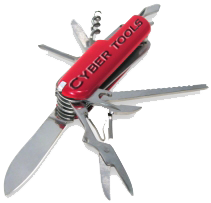Latest News
First 'All-hands' Meeting
On October 18th, the first All-hands Meeting for the NSF RII award took place in Baton Rouge. As members of the RII Advisory Board, Ron Hutchins, Jordan Konisky, and Vince McCoy were present. Two of the LONI Institute fellows attended the meeting as well. You can download presentations of Drs. Allen, Cortez, Gaver, Khonsari, and Seidel. Here are pictures and a few more details on the meeting. [Other News]
Description of Work Package 2
Reliable, up-to-date information is vital for developing and implementing various scientific applications. Information services will be developed for discovering, monitoring, and providing information about compute, network, data resources, as well as for running applications and experiments. Experience with existing information packages in current research projects indicates that both Grid (e.g., MonaLisa, GPIR, NWS) and production HPC (e.g., Nagios and Big Brother) information services present increasing research challenges as we move from prototypes to production environments. Protocols, models, schema and APIs will all be developed to enable scientists and applications (e.g., CFD, MD, surge) to interact in a heterogeneous information services infrastructure. Critical components of the complex CI environment we intend to provide for LONI include simplified interfaces that enable non-expert users to interface to resources and services, collect information, monitor/steer jobs, and support collaborations.
A particular focus will be in the area of application monitoring (see WP4), critical for DDDAS applications, and for collaborators to interact in real time with their simulations and experiments. We will also develop portal interfaces that simplify the development, deployment, and reuse of complex application software and new Grid technologies. We will create generic application portlets using the well-known GridSphere framework (Allen and Seidel oversaw GridSphere as GridLab PIs). WP2 will develop and deploy a general GridSphere-based LONI portal, based on ongoing work at CCT, with general HPC portlets. Scientists will be able to easily monitor machine and service status, submit jobs, track and manage allocations, through simple interfaces to our developed services. WP2 will work with each S&E group to develop application-specific portals, leveraging ongoing portal work in associated projects and where possible taking advantage of existing Cactus portlets. As a first driver application, we will assemble generic components to develop a Cactus CFD-portal that can be used for all S&E projects.
[ Back to top ]
